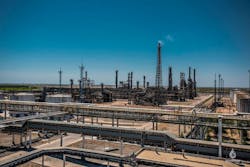Uzbekistan’s Bukhara Oil Refinery lets contract for modernization project
JSC Uzbekneftegaz subsidiary Bukhara Oil Refinery LLC (BOR) has let a contract to Honeywell UOP LLC to provide a suite of process technologies for the previously announced modernization and reconstruction project at BOR’s 50,000-b/d condensate refinery at Karaoul Bazar, located 55 km from Bukhara, in southwestern Uzbekistan, 437 km southwest of Tashkent (OGJ Online, July 10, 2020).
Alongside delivering technology licensing and basic engineering design services for a series of new units to be added during the overhaul, Honeywell UOP also will participate in revamping the refinery’s existing diesel hydrotreating and amine regeneration units, the service provider said on Sept. 8.
In addition to a new hydrotreating unit, Honeywell UOP’s scope of licensing and engineering design delivery on the project will include the following units equipped with UOP proprietary technologies:
- A Par-Isom unit for upgrading light naphtha into high-value isomerate for gasoline blending.
- An RFCC unit for converting heavy feedstocks into cleaner-burning gasoline and diesel products that meet the latest global emissions regulations.
- A SelectFining unit, which uses selective hydrodesulfurization of naphtha to meet low-sulfur gasoline specifications while minimizing octane loss.
- A Merox unit for treating naphtha feedstock to meet requisite product specifications.
The service provider disclosed no details regarding either the value of the contract or capacities of the new units.
This latest contract follows BOR’s July 2020 award to SK Engineering & Construction Co. Ltd. (SK E&C) to deliver front-end engineering design services for the modernization project, which—alongside aiming to increase existing processing capacities to 95% from 79% and production of light oil products to 91% from 77%—intends to expand the refinery’s capabilities to convert and upgrade heavy oil and fuels into more environmentally friendly Euro 5-quality gasoline and diesel in compliance with the government of Uzbekistan’s stricter specifications for fuel products taking effect in 2023.
In addition to upgrades at the refinery’s existing atmospheric distillation unit, gas oil hydrotreater, and amine purification units, the modernization project will include the addition of a new naphtha hydrotreating unit, light naphtha isomerization unit, fuel oil catalytic cracking unit, and a short-cycle adsorption unit to help increase hydrogen purity, according to BOR.
Stages
Previously planned at a total investment of $600 million, the three-phased Bukhara refinery modernization and reconstruction project—already under way and to be executed in three phases—now will cost an estimated $678.5 million according to an Aug. 10, 2020, release from Uzbekneftegaz.
The first stage, completed in early 2020, involved replacement of the catalyst system in the refinery’s existing gas oil hydrotreater to increase production of Euro 4 and Euro 5-quality fuel.
Scheduled to be completed by yearend 2022, the second-stage modernization work will include upgrading and reconstructing existing processing units at the site to enable 100% production of Euro 5-quality diesel, as well increase output of high-octane gasoline grades AI-91, AI-93, and AI-95.
Slated for completion in 2025, the modernization program’s final stage will involve construction of new units focused on improving the refinery’s overall crude processing to 95% of its nameplate capacity, as well as boosting its production of higher-value, light oil products to 91%.
While Bukhara’s modernization and reconstruction program will not increase the refinery’s current 50,000-b/d crude processing capacity, the project, once completed, will enable the plant to produce 1.2 million tpy of gasoline, 750,000 tpy of diesel, and 200,000 tpy of jet fuel, all of which meet Euro 5-quality standards.
About the Author
Robert Brelsford
Downstream Editor
Robert Brelsford joined Oil & Gas Journal in October 2013 as downstream technology editor after 8 years as a crude oil price and news reporter on spot crude transactions at the US Gulf Coast, West Coast, Canadian, and Latin American markets. He holds a BA (2000) in English from Rice University and an MS (2003) in education and social policy from Northwestern University.

